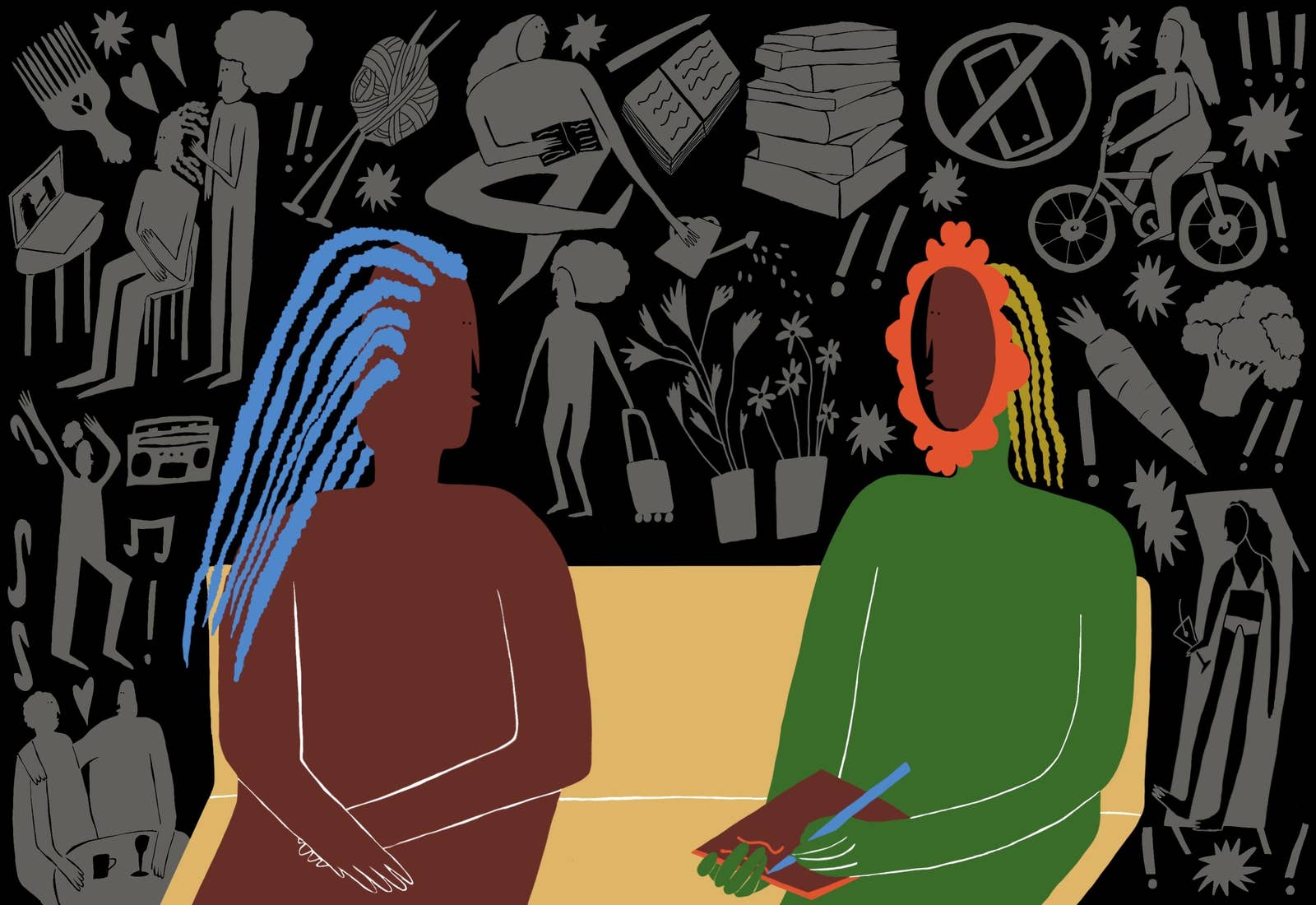
For Grace Johnson of Queens, New York, having a Black woman as her therapist means she doesn’t have to explain herself as much, especially when it comes to cultural references. Ask her for an example, and she won’t hesitate. It was September 2020, two months into their time working together, when Netflix started showing old episodes of the early 2000s series Girlfriends. Watching the reruns, she saw the characters — and herself — with fresh eyes.
Johnson had just started her first big job as an attorney and was weathering sadness from a tumultuous breakup with her girlfriend, which was what initially led her to seek therapy. But instead of leaning back and zoning out to the show’s millennial nostalgia, Johnson took notes.
“I just identified with it all a little too much,” she said. “Anything a man did in Joan’s life could mess up her week. She was such a reactive person.”
After this epiphany, she wrote her therapist an email.
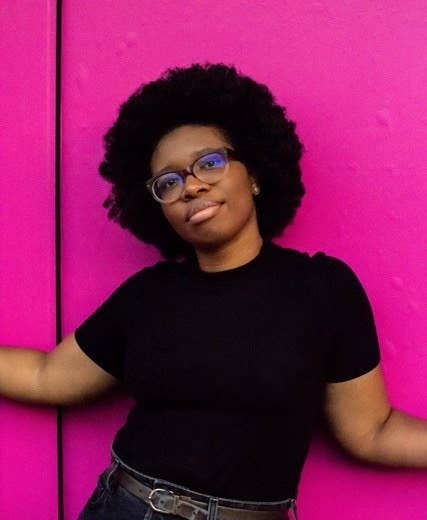
“I was like, ‘Hey, I just finished watching a couple of episodes of Girlfriends because it’s on Netflix. Everything that Joan does feels a little too close to home,’” Johnson said. “And then she emailed me back — ‘I was just about to start watching. I’ll pay extra close attention. Talk soon.’”
Having a Black woman as her therapist, Johnson feels more comfortable showing up as her full self and using cultural touchstones that will be understood without explanation.
While having a therapist that matches your identity is not a guarantee you’ll make real progress, many Black people prefer working with a Black therapist. Unfortunately, significant barriers limit access to mental health therapy for many Black people in the US, including a dire shortage of providers that match their identity and in some cases, a societally imposed gap in knowing when to look for help in the first place.
Such was the case with Johnson. Before seeking help, mental health was the furthest thing from her mind. She dismissed her symptoms of depression as a natural outcome of her circumstances. The earliest instance of her explaining away her pain was when she was 10 years old. Her family had just immigrated to the US from Nigeria.
“I was feeling a deep sadness and loneliness back then, but I would just chalk it up to moving to America or whatever normal kid things were going on,” Johnson said.
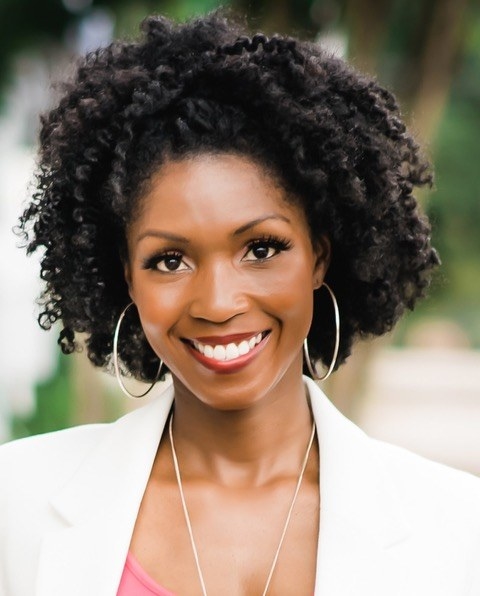
“A lot of people still think that folks who get mental healthcare are weak,” said Rheeda Walker, a psychologist, professor, and author of The Unapologetic Guide to Black Mental Health: Navigate an Unequal System, Learn Tools for Emotional Wellness, and Get the Help You Deserve.
Walker wrote the book after seeing statistics about the rate of suicide among Black children. According to the American Academy of Child and Adolescent Psychiatry, Black youth in their early adolescence are twice as likely to die from suicide as white people the same age.
While suicide rates among Black people in the US have historically been lower than in other groups, those rates went up in children aged 5 to 11 from 2001 to 2015, according to a 2018 study in the journal JAMA Pediatrics. A 2019 report in the Journal of Community Health found that the suicide rate in Black adolescent girls rose 182% between the years 2001 and 2017.
As a Black woman, a mother, and a psychologist, Walker felt she had to do something.
“We have adults who are responsible for these children, and if the adults are overwhelmed with untreated anxiety and depression, then they’re not going to have the wherewithal to be available for children who are in need,” Walker said.
Some readers have approached her to say her book inspired them to seek therapy. Others have told her they read the title and assumed it was just for “crazy” people.
“Unfortunately, I don't think that we've moved the needle a lot as a society in the US on asking for help. That is still moving at a glacial pace,” Walker said. A 2021 report from the CDC’s National Center for Health Statistics found that 20.3% of American adults had sought some form of mental health treatment within the last 12 months. Separated out by race, that includes 24.4% of white adults and 15.3% of Black adults, a 1.5-fold disparity.
How to find a Black therapist who gets you
When Johnson decided to look into therapy, her initial issue centered around a queer relationship. She felt willing to educate a mental health professional on the culture surrounding her queerness, but not her Blackness. In the summer of 2020? Absolutely not.
“I just was not willing to explain anything to a white person at that moment in time,” she said.
In the directory of clinicians, her therapist’s friendly smile first got her attention. Then, her little one-paragraph blurb, which Johnson called a “therapist manifesto,” sealed the deal.
“She wrote about helping folks to chart out their lives, and I think that’s really necessary for us immigrant kids,” Johnson said.
Finding a Black woman therapist with availability, actually covered by her insurance, with whom she was compatible, and on her very first try — Johnson knows is an anomaly.
“A lot of people I know have not had it this easy with finding Black therapists, especially finding ones who actually get it,” she said.
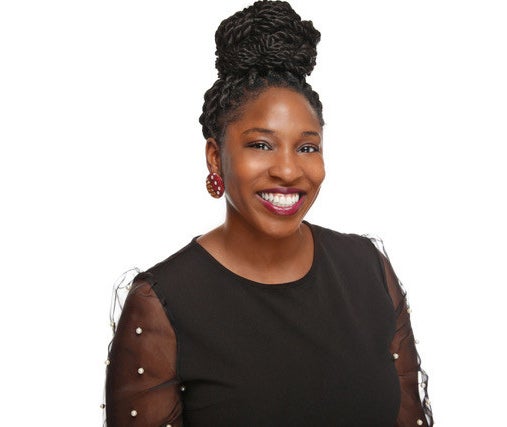
A therapist “getting it” will vary from person to person; any one characteristic, including cultural identity, is no guarantee of a match. “The biggest thing that helps you make progress in therapy is therapeutic alliance,” said Raquel Martin, a Tennessee-based therapist.
On TikTok and Instagram, Martin has a loyal following and regularly drops three to four psychology-related gems per day.
“If I have a therapist who has the keys to the kingdom, the answer to the world, and I don't like their vibe... I'm gonna be like, you know what, I'm cool. I'm good on you,” she said.
But to be able to check a therapist’s vibe, you first need to actually find someone, and finding a Black therapist may require extra work. Many insurance company websites do not offer an option to search by race.
However, one of the most popular tools available is the therapist finder on Psychology Today, which after searching first by location offers a field not necessarily for the race of the therapist but for “ethnicities served.”
TherapyDen, an online mental health directory, does have filters that allow you to search by ethnic background, familiarity with a specific religion, or other identifiers. There is also the National Queer & Trans Therapists of Color Network, which has a searchable database.
Other resources include BEAM’s Black virtual wellness directory, Therapy for Black Girls, and Black Female Therapists.
Black men therapists may be particularly difficult to find
The dearth of Black mental health clinicians has been well documented, including on a recent episode of Last Week Tonight With John Oliver and a May 2021 NBC News report. Black people are significantly underrepresented in the field of mental health in America, comprising about 4% of the psychology workforce, according to the American Psychological Association. (Psychologists make up roughly one-third of mental health professionals; many therapists are licensed in social work, counseling, or marriage and family therapy.)
The reasons for this are multifaceted, beginning with academia, the ultimate gatekeeper. People often have to take out loans just for living expenses, in addition to tuition. “Think about who can afford to do that,” said Martin. “That’s not people who look like me.”
“As you go higher and higher up the educational pipeline, there are fewer and fewer,” said Walker.
Martin recently posted a video to TikTok responding to the NBC report. She explained that, when it comes Black men therapists, there may be much deeper reasons than needing more scholarships.
“Black boys can’t express negative emotions because that can be the difference between life and death,” she said. “Why would they grow up and feel like they’re qualified to apply for a job where they have to talk about feelings when they’ve never been able to acknowledge their own?”
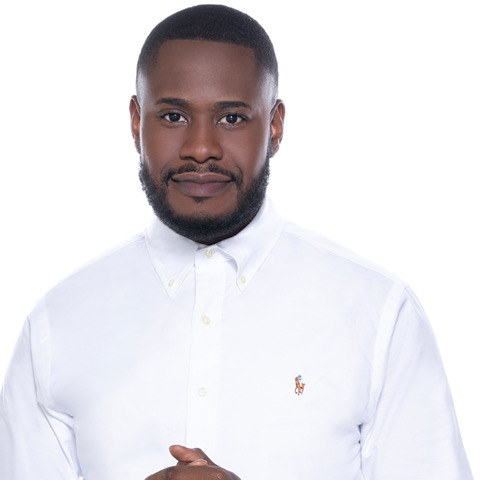
The crisis led licensed clinical social worker and therapist Arron Muller to create the Facebook group Black Male Therapists. The community currently has over 800 members from across the US.
“Whenever I recognize a need, the social worker in me asks, ‘How can I create a lane for it? How can I create a solution?’” Muller said. “The group is there for us all to connect and support each other. Someone might say, ‘Hey, are you in Arkansas? I know somebody looking for someone down there,’ or ‘Hey, I’m up here in Michigan, and I have openings.’”
There are other potential barriers to access
These geographic discussions Muller describes arise because of another major barrier that hinders potential clients trying to access therapy: Many therapy licenses are limited to a single state.
“It would be good if we could get through this barrier where you can only practice in certain states. With these state lines, it gets really, really murky,” Muller said. “I'm glad everybody is waving pom-poms for therapy, but now that people are talking about it, the next level is access to readily available therapists.”
There is a potential workaround that would allow psychologists in some locations to practice across state lines. It’s called the Psychological Interjurisdictional Compact (PSYPACT). (There are similar movements to do the same for other types of therapists, including licensed clinical social workers, licensed marriage and family therapists, and licensed professional clinical counselors.)
A single license from the organization currently allows a psychologist to take patients from 31 different states. The number increased on Oct. 1, when Connecticut came on board, and will again on Jan. 1, 2023, when Rhode Island’s PSYPACT-related legislation will become effective. Massachusetts, Michigan, and New York have also introduced PSYPACT legislation.
Notably absent from the PSYPACT map are two of the three most populous US states. The interjurisdictional legislation failed in the Florida Statehouse. And, in California, a Change.org petition with 1,449 supporters is calling for the state’s psychological association to act.
Martin, who is a PSYPACT-licensed therapist herself, also lauded the program from a client’s perspective. When she moved to Tennessee, she struggled to find someone local. Anyone who seemed like they might be a good fit had a full client roster. She thought she’d never find anyone with whom she would have as good a working relationship as she’d had with her therapist back in Maryland. Luckily, she didn’t have to.
“I reached out to her saying, ‘Hey, have you tried PSYPACT?’ She looked into it and got approved,” Martin said.
Because there are so few Black mental health clinicians, many of them have long waitlists because they simply don’t have the bandwidth to accept new patients.
“I have never come into a new clinic and not had a full waitlist within my first week,” Martin said. “In the beginning, I took on everyone because everyone said they needed me. But then, you get burnt out quicker, especially dealing with trauma, especially dealing with racism and race-related stress, especially dealing with the fact that I’m also a Black woman in this world, so I also need to see my own clinician to deal with racism.”
The demand placed on Black mental health providers has only grown in recent years.
“The last couple years, with COVID and everything, have sent emotional health challenges through the roof in a way that I haven't seen in 20 years, and that’s across the board for everyone,” Walker said. “It's been tough. And it's been tough for our clinicians, who themselves are managing their own lives.”
Questions to ask therapists in general
That said, not every person will see someone with the same cultural identity, either because of a lack of provider availability or personal preference. Walker’s book has a section for that.
“It literally tells folks, like, ‘Listen, you might have to see a white therapist,’” she said.
In the book, Walker suggests asking a clinician what percentage of their clients are African American or Jamaican or who are first-generation US citizens. She goes on to write, “If the question elicits discomfort, that might be all the data you need.”
Similarly, Martin created a fillable PDF therapist interview worksheet, which she has published on her website. The seven-page document includes questions to gauge the person’s comfort with discussions of race, gender, and sexuality, as well as their preferences for contact method and availability.
On a page labeled “vibe check,” she lists potential adjectives for a client to describe the therapist and how the therapist made them feel.
Finding the right person, whether they match your identity or not, can make a big difference. Johnson's therapist helped her to find a path forward — beyond the life she thought she was supposed to have.
“‘You've willed everything that you want into existence, oftentimes against many, many odds,’” Johnson recounted her therapist saying. “‘You're incredibly resilient. And you're strong, you know, the strong Black woman trope, but you’re actually strong. What have you lost? What do you need to mourn because of the fact that you are so strong and so resilient?’ That session actually ended in tears, even though it started with us talking about a TV show.”
She and her therapist began focusing on recognizing the ways depression disrupts Johnson’s life, including self-care and grooming. They discovered that multistep processes often tripped her up and dedicated entire sessions to constructing step-by-step plans for her week, down to the most minute details.
“Go to the gym” was broken into “get dressed, leave home, board train, walk to gym, go inside, check in, etc.” When Johnson once told her therapist she was deferring maintenance with her hair, and she was feeling anxious and guilty, her therapist offered a suggestion.
“She said, ‘Maybe just get braids.’” Braiding her hair would require less daily maintenance, giving Johnson the mental space to work through other things and not view her hair as a chore.
“This is me caring for myself. This is a thing I want to enjoy. I don’t want it to be attached to a feeling of guilt, and she really got that. When I expressed having anxiety about leaving the house to go do it, she suggested, ‘What about a traveling braider?’ I would have never even thought about that,” Johnson said. “That would have never happened if my therapist wasn’t a Black woman.” ●
